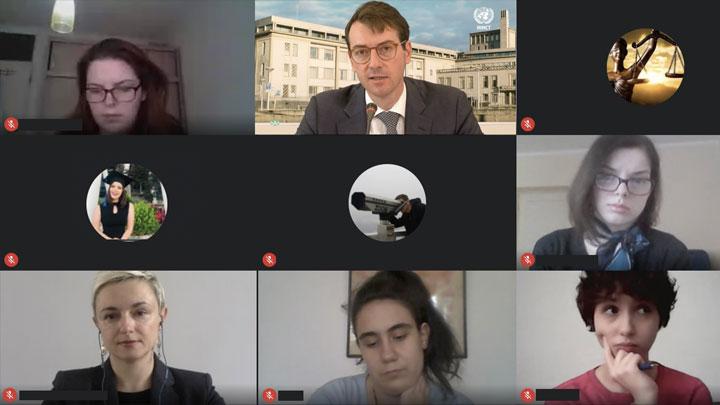First semester of the second cycle of the Mechanism’s Inter-University Video Lecture Programme comes to an end

The first semester of the second cycle of the Mechanism’s Inter-University Video Lecture Programme (Programme) wrapped up this week, with a lecture on “Destruction of Cultural Heritage” delivered by Kevin Hughes, Chief of Staff of the Office of the Prosecutor at the Mechanism.
The Programme, entitled “International Law and Facts Established before the ICTY”, brings together postgraduate students from eight law faculties across the region of the former Yugoslavia. The second cycle was launched in October 2020 by the Mechanism’s President, Judge Carmel Agius, who spoke about the “Creation and Jurisdiction of the ICTY”.
Featuring a series of lectures by different speakers from Chambers and the Office of the Prosecutor, the first semester of this year’s Programme focused on the region’s recent history, the role and contribution of the ICTY, and principles of international criminal and humanitarian law. More than 100 students have taken part in the 2020 cycle so far, including law students from the University of Donja Gorica, the University of Niš, the University of Podgorica, the University of Priština, the University of Sarajevo, the Ss. Cyril and Methodius University of Skopje, the University of Vitez, and the University of Zagreb.
In early December 2020, students from the participating universities collaborated together in an exciting new component of the Programme, where they prepared shared presentations on several topics including “Developing International Law”, “Bringing Justice to Victims and Giving Them A Voice”, “Processing Crimes of Sexual Violence”, and “Establishing the Crime of Genocide: Srebrenica”.
During their presentations, the students discussed the most important achievements of the ICTY, as well as its legacy and influence on the local judiciary. They highlighted the significance of witnesses’ voices and providing justice for victims. In addition, they called for joint efforts to ensure that young people in the region of the former Yugoslavia protect judicially established facts in order to help prevent future genocides.
The Mechanism’s engagement with university students and lecturers will continue to focus on expanding and strengthening the network of law faculties from the region of the former Yugoslavia. These faculties will participate in a future series of joint video lectures and complementary activities.
The Programme forms part of the wider Mechanism Information Programme for Affected Communities (MIP), which was launched in January 2019 to increase awareness and knowledge among affected communities about the 1990s conflicts in the former Yugoslavia, based on ICTY and Mechanism cases. The MIP is generously supported by the European Union and the Swiss Federal Department of Foreign Affairs.